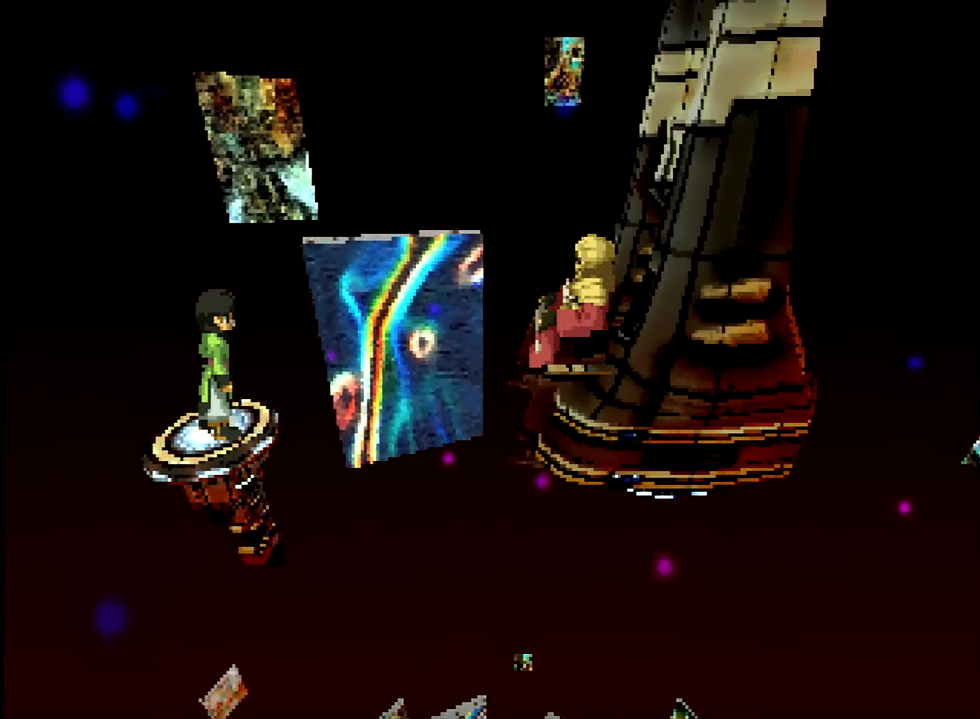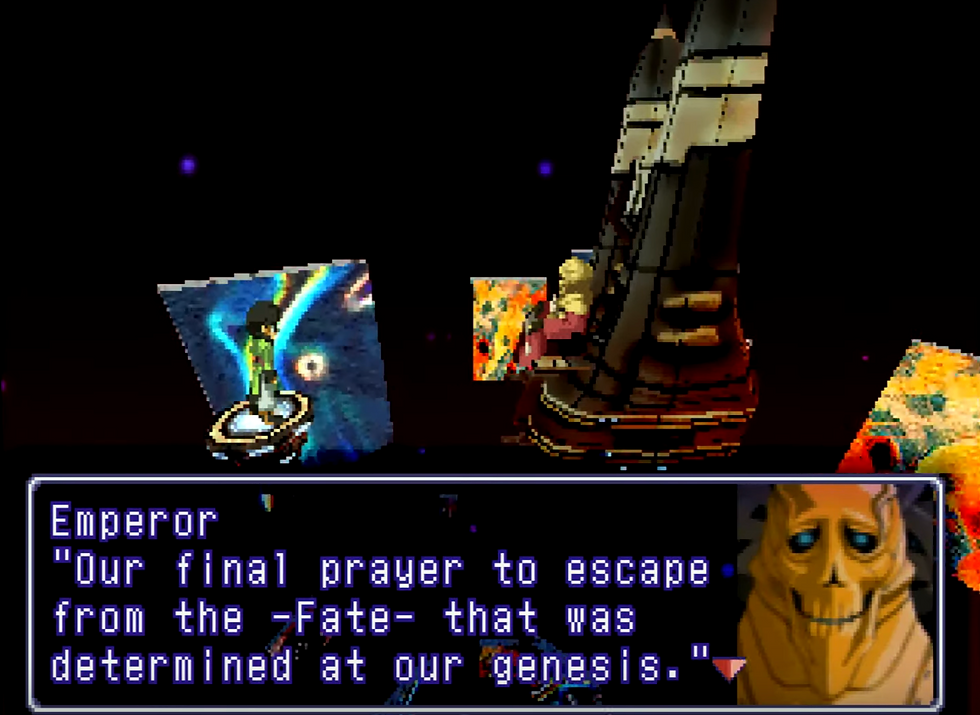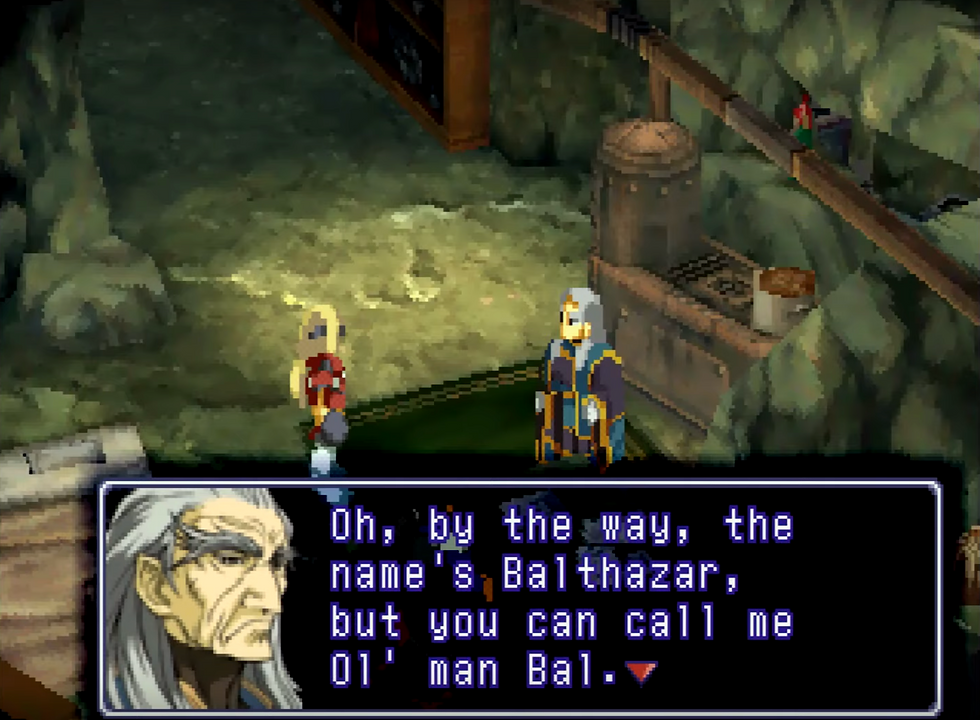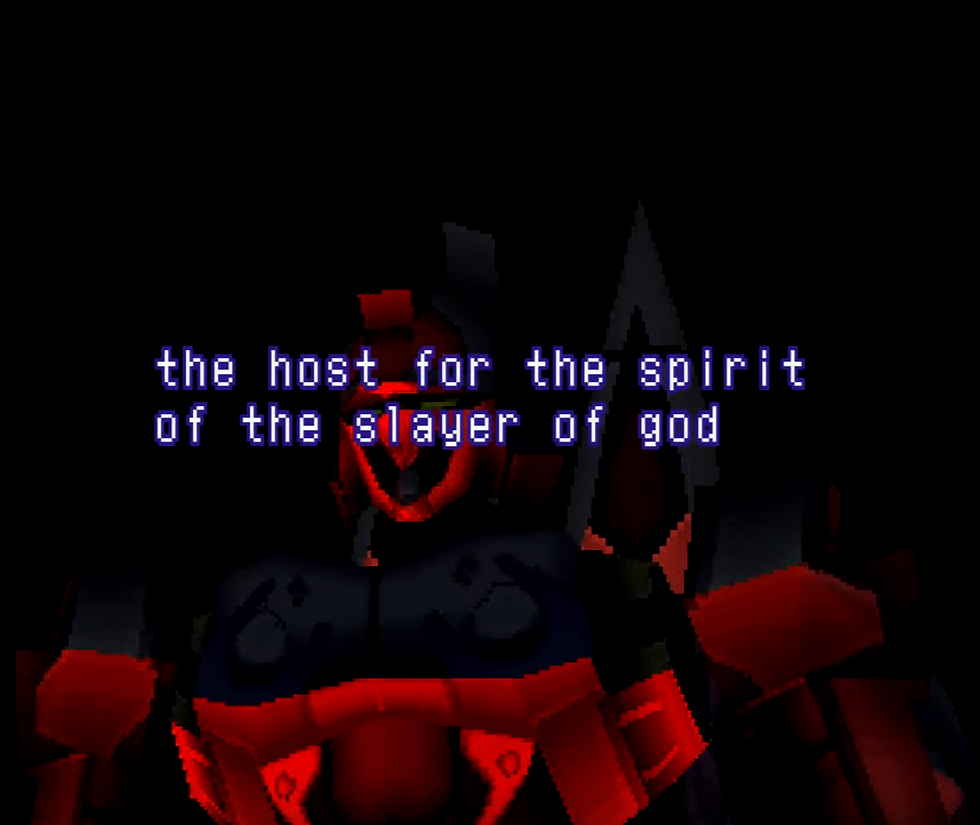
Okay, though not too much to note of significant interest in this update, we're back at it with some immediately juicy stuff with the first appearance of Emperor Cain. Feel free to download the updated script and follow along. We left off with Fei and Citan captive on the Aveh transport, and are treated to a flashback scene here of Citan talking to Cain in his throne room. Cain mentioned "the age of the gospel" beginning. The Japanese reads 「やはり迫っているのか?。。。福音の劫<とき>が。。。」 which the English translates as "Could it be that we are approaching...the -Time- of the -Gospel-...?" The Japanese kanji character used for time in this actually translates to something more like "eon" or "kalpa," essentially a long cycle of cosmic time, but next to it is written in hiragana, the word toki written in hiragana which simply means "time." In the Xenogears universe, Citan is referring to the period of history in which Deus' self-restoration program is nearing completion, a 10,000 year time limit. If restoration isn't complete by the end of the cycle, a safety device triggers, eliminating all human life via a function built in to the Zohar that is capable of changing past events. This is also a layered allusion to the Gospel of Christianity. The Christian gospel can refer to both the Christian message, but also the news of the imminent coming of the kingdom of God and divine judgment. Most commonly, the Gospel can refer to the books in which the Christian message was spread via the four books of Matthew, Mark, Luke, and John. In Xenogears, I think the intent is mostly just to indicate the coming of God's judgment of all living things. Deus is basically going to erase all life, whether it uses humans to self-restore or not. Emperor Cain, with knowledge of the situation, is aware that Deus' self-restoration is imminent.

As for the character of Cain himself, this is our first introduction to him and his explanation of the Age of the Gospel is still cryptic to the player at this point. We don't know who he is or what he's really talking about. His character is very obviously biblical in scale and allusions abound here. Mostly to Cain and Abel of the titular story in the Book of Genesis I previously explained. This is actually a key plot revelation of which its meaning will only become clear to the player later, but they're basically telling you at the start of the game, God is about to be resurrected. The language here is old fashioned Japanese, and Cain in the context of the story is a VERY old character so I've made his language and speech biblical sounding in nature.
Towards the end of his expository dialogue, there's an interesting translation choice in the original. For what I've translated in two text boxes as as "If we fail to fulfill our divine assignment...Then the -Fate- that was destined upon us since our genesis is nigh…"
The Japanese reads 「それが叶わぬ時は...」. The original English translation reads "This is our final prayer...Our final prayer to escape the -Fate- that was determined at our genesis." I do like how this way of translating connects to a religious action of prayer, but I also think it's a bit convoluted. The player is already kind of bombarded with terms and symbolism so I've chosen to translate it in a more direct way closer to the original messaging of the Japanese so as not to lead the player on in thinking the reference to a "final prayer" is something of importance.

Some stuff happens, Bart attacks like an idiot, Fei and Bart fall into the stalactite caverns like idiots, and then Ol' Man Bal! For my translation, I've taken out the "Ol' Man" in his name. In the original English, he introduces himself as such, but that seems so unnatural for a self-introduction so I've removed it (though I have the characters at certain points refer to him as "old man," I've adjusted his text box name to read "Bal.") The Japanese calls him バル爺 which, directly translated is "Old Man Bal," but even in Japanese, no one would ever add the 爺 (for "old man") when introducing themselves. It would only be natural when being referred to by others, not when referring to yourself. Anyways, Bal tells you some old legends, hypothesizes that humans didn't exist until 10,000 years ago based on fossil records, and tells you that to get out you need to activate the sand sensors to open the barrier wall outside his house. So go do that...

And now we're back. There's not too much to note in the scenes with Bal, but one thing in particular I thought was interesting was his dialogue following his discovery of Fei's gear, Weltall. In the original English, he says "This is...the host for the spirit of the slayer of god."
This multiple usage of "of" and "for" reads pretty clunky to me so I've changed it to read,
"This is...the host for the spirit of thou who shalt destroy god…"
In the Japanese, it reads「こいつは。。。神を滅ぼす者の憑代。」
In Shinto mysticism, the term 憑代 "yorishiro" refers to an object either representative of a divine spirit or that divine spirits are drawn/summoned to. It denotes a 神体 shintai (an object of worship believed to contain the spirit of a deity) or even sometimes a shrine precinct itself. Referring to Weltall in this way obviously has a lot of religious subtext given Fei and Weltall's relationship and the true nature of the machine, but the translation in English is also particular interesting as there is really no graceful English equivalent. "Host" is probably the closest as it has the biological implication of a host organism, or living vessel, but also can be used in certain religious connotations as in a collective of angels, and also the bread consecrated in the Eucharist. On a side note, I've chosen to make Bal's speech here biblical sounding for this line only to allude to his supposed deeper knowledge of the situation.

Anyways, seeing Weltall tips Bal off that something's up and he no longer likes you and kicks you out of his house. What an asshole. Then you fight a big fatty, and meet up with the homeboys. Life is good! At least for another ten minutes.
Find out what happens next time whenever I translate the next ten pages of the script!
-Nino



I don't remember exactly how the scene plays out but if Bal is referring to the "slayer of god" as a "3rd person" i.e. he/she/it, then "thou" is incorrect as that is meant for the "2nd person" i.e. you -Suggestions "This is... the host for the spirit of the Godslayer" -or "This is... the host for the spirit of he who shalt destroy god" -one more "This is... the host for the spirit of he who shalt slayeth god"